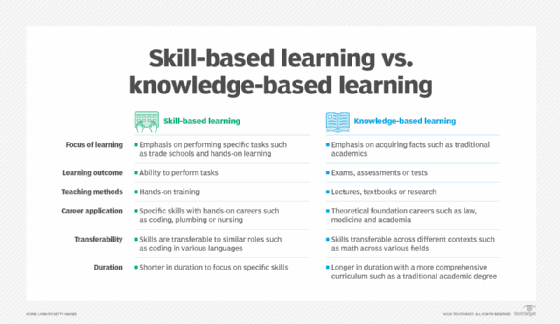skill-based learning
What is skill-based learning?
Skill-based learning develops students through hands-on practice and real-world application. Specific skills -- reading, writing, speaking and overall literacy progression, for example -- are both taught and intuited through repeated situational exposure and demonstration.
Skill-based education ensures a learner's competency, flexibility and, therefore, overall value, ingraining the new skill while also awakening a recognition of its portability from one area of interest to another.
A worldwide revolution has made almost every classroom and workplace dependent on technology, highlighting the vital importance of literacy, ethical decision-making and clear communication in the field. Technology's ubiquity helps explain skill-based learning's emphasis in the 21st century. Beneficial to students, teachers, employees and employers alike, this style of learning is designed to target and sustain a higher level of retention.
Why is skill-based learning important?
Skill-based learning is utilized across an array of fields and subjects due to its malleability and proven benefit to the learner's proficiency in any workplace. Successfully harnessing a skill-based approach to learning leads to personal and professional growth, bringing long-sought-after goals within reach. Developing these skills means boosting one's self-confidence, raising job satisfaction and improving one's adaptability.
This approach facilitates the development of numerous skills that improve performance. Time and again for the learner, skill-based learning produces the following:
- Exceptional return on investment (ROI).
- Improved problem-solving.
- Genuine communication.
- Sharpened analytical abilities.
- Real-world experience.
- Enhanced creativity and innovation.
- Strengthened sense of purpose.
- Superior collaboration.
Producing a high ROI has always been important in determining a worker's value to any employer. Even an interviewee's brief history of ROI is an advantage as prospective employers seek proven competency with practical skills, coupled with the flexibility and desire to seek out and flourish in any job.
In the workspace, strengthening these practical skills also creates opportunities to improve soft skills while continuing and expanding the cycle of skill-based learning. For example, an employee who's recently mastered a skill can share that knowledge with fellow workers, becoming a key contributor in closing the skills gap among fellow employees. This in turn promotes healthier workplace chemistry, furthering the listening, organizational and leadership abilities of everyone involved in the ongoing process.
Skill-based learning vs. knowledge-based learning
Whereas skill-based learning strives to teach within the context of a given skill, knowledge-based learning requires a learner's familiarity with real-world events and examples from which to draw.
Skill-based education seeks to establish a strong foundation of competency with an eye toward further hands-on building and development, while knowledge-based education aims to deepen a specific insight and further develop one's perspective. As opposed to deliberate practice, knowledge-based learning includes testing, analysis and questioning. This method develops one's work ethic and improves communication and thinking skills.

Where can skill-based learning be implemented?
Skill-based learning is now found in many workplaces, as well as on sites such as LinkedIn, Indeed and Skillshare, yet it is most commonly associated with the education system. Examples of skill-based learning include preschool students developing their literacy and verbal abilities, as well as high school students using a disciplined approach to define and enhance their real-world and social skills. Following secondary school, skill-based learning is typically found in internship programs and higher education within a learner's subject of choice.
Skill-based learning is designed to become inherent in the worker, so when someone with this skill-based background enters a work environment, that person possesses the basics needed to perform the job adequately and the drive to enhance those and other related abilities through continuous learning. Ultimately, in addition to the personal growth of individuals exploring skill-based learning, collaboration and communication flourish in the workspace.







